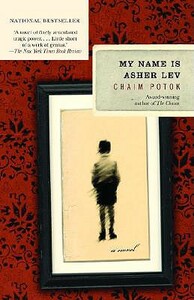Take a photo of a barcode or cover
emotional
inspiring
reflective
sad
slow-paced
Plot or Character Driven:
A mix
Strong character development:
Yes
Loveable characters:
Complicated
Diverse cast of characters:
Complicated
Flaws of characters a main focus:
Yes
3.5 stars- I would've liked it more f I didn't have to annotate it. It was actually quite interesting and was really deep and symbolic, which I guess was the reason they picked this for Honors ELA reading.
My Name is Asher Lev by Chaim Potok started as a slow read for me and I was puzzled at its high ratings despite the writing. At times during part one, I could not wait for Asher to grow up and I felt that I could have understood his relationship with his parents and his gift in less pages.
Then there came a turning point in part two when this book would not leave me. And I got it.
The characterization and setting are this novel’s strong points. I was transported to a Brooklyn in the 1950s and ‘60s when a little boy could walk the streets and ride the subway alone. I learned about Hasidic Jews and the inherent conflict of one who wants to be an artist; I wonder if that is still the case.
The part that bugged me about this book is that whenever someone asked Asher his name, he responded with “my name is Asher Lev.” Who does that? It was understandable when he was a child, but as an adult it made him sound like a robot.
I debated whether to rate My Name is Asher Lev as a four or a five, because of the slow start and I am not sure this is a book I would take with me to a deserted island (my usual barometer). But I do know that this is a magical book and one whose characters, I will never forget. That is why I went with the five.
Read it.
Then there came a turning point in part two when this book would not leave me. And I got it.
The characterization and setting are this novel’s strong points. I was transported to a Brooklyn in the 1950s and ‘60s when a little boy could walk the streets and ride the subway alone. I learned about Hasidic Jews and the inherent conflict of one who wants to be an artist; I wonder if that is still the case.
The part that bugged me about this book is that whenever someone asked Asher his name, he responded with “my name is Asher Lev.” Who does that? It was understandable when he was a child, but as an adult it made him sound like a robot.
I debated whether to rate My Name is Asher Lev as a four or a five, because of the slow start and I am not sure this is a book I would take with me to a deserted island (my usual barometer). But I do know that this is a magical book and one whose characters, I will never forget. That is why I went with the five.
Read it.
emotional
inspiring
reflective
slow-paced
Plot or Character Driven:
Character
challenging
emotional
reflective
medium-paced
Plot or Character Driven:
Character
Strong character development:
Yes
Loveable characters:
Complicated
Diverse cast of characters:
Yes
Flaws of characters a main focus:
Yes
Graphic: Death, Antisemitism
Moderate: Bullying
Minor: Fatphobia, Car accident
It was an amazing book. Very sad in the end though. I loved all of the concepts and it was much more interesting than I had thought it would be. I would recommend it to others. I learned a lot about Hasidic Jews and few other things about art that I had yet to learn and some history of the world. The book was a great read. There were some quotable things in it as well, so if you're a quote junkie like me, then you will really like the book.
4.5 stars
Chaim Potok's writing is quite remarkable! Being a rabbi, Potok's works would explore the lives of Hasidic and Orthodox Jewish subjects and their struggles, but often, these struggles took place internally or within their religious community as opposed to taking place in their exterior world. My Name Is Asher Lev is a prime example of the central character's very own struggle. Within a religion that is grounded, is filled with rules, and requires a lot from its followers, Asher sees a different sense of potential for himself and takes on a passion in art. The way that Potok writes, though, he does so in a way that any Jewish reader can find a sense of connection, while a non-Jewish reader does not only have the ability to connect in an emotional way, but it is written in a way that is accessible and in a way that they develop a greater understanding for Hasidism, their rituals, and how they go about serving their G-d.
Asher Lev is a Hasid that was born in 1943 and grows up living with his parents, Aryeh (father) and Rivkeh (mother). Aryeh works serving the Rebbe and frequently travels, feeling that it is best to meet the people he is helping face to face.
As Aryeh mentions:
"To touch a person's heart, you must see a person's face. One cannot reach a soul through a telephone" (117).
In a time and place where it is typical that people text and use their cell phone to the point that it is easier to reach them from a phone than in person, this line was a breath of fresh air and a reason that this can be deemed a modern classic.
Aryeh picks up a position in Europe, which creates a great strain between he and his son, one that has already developed on the basis that Asher is an artist that paints what he sees in as honest a way as possible. Aryeh feels art to be pointless and frequently scolds and chides Asher for his actions. Asher's mother does her best to serve both of their needs, as she studies Russian affairs to assist her husband, while providing Asher with the support and material he needs in order to paint, though most of this Asher gets on his own. As time progresses, Asher begins to establish himself as a painter and comes under the wing of Jacob Kahn, which creates a sense of extremity that positions itself on the complete opposite of the spectrum in which his parents would wish. Asher, though, seems to fall in the middle, where he wants to paint things as he sees them, but at the same time eats kosher, prays three times a day, loves his parents, and cares for those within his Hasidic community. This was an aspect of the book that I really liked, for it made Asher a human being that came with complexities for both sides, but yet he certainly had something to offer to the art community.
My Name Is Asher Lev is an accomplishment in how it addresses the bridge between religion and art and how it should be perceived and accepted. Being a reader that approaches this objectively as far as religion is concerned, I feel as if Asher is a very determined, but at the same time an individual that means well, even if it causes grief in his heavily religious parents. I like the nature and the fleshing out of each of the characters and how each meant well, despite being firm and passionate in their nature. I like the pacing of the piece, as it flows in a way that we get just enough of what we need to know about a particular event in Asher's life and highlights of other periods of time within. While there were moments in which I wish that information was not withheld (like when Asher Lev says that he has told someone something and yet we do not find out what it is), it was an overall very good piece.
I am definitely inclined to read more by Chaim Potok, including the sequel to this novel, The Gift of Asher Lev.
Chaim Potok's writing is quite remarkable! Being a rabbi, Potok's works would explore the lives of Hasidic and Orthodox Jewish subjects and their struggles, but often, these struggles took place internally or within their religious community as opposed to taking place in their exterior world. My Name Is Asher Lev is a prime example of the central character's very own struggle. Within a religion that is grounded, is filled with rules, and requires a lot from its followers, Asher sees a different sense of potential for himself and takes on a passion in art. The way that Potok writes, though, he does so in a way that any Jewish reader can find a sense of connection, while a non-Jewish reader does not only have the ability to connect in an emotional way, but it is written in a way that is accessible and in a way that they develop a greater understanding for Hasidism, their rituals, and how they go about serving their G-d.
Asher Lev is a Hasid that was born in 1943 and grows up living with his parents, Aryeh (father) and Rivkeh (mother). Aryeh works serving the Rebbe and frequently travels, feeling that it is best to meet the people he is helping face to face.
As Aryeh mentions:
"To touch a person's heart, you must see a person's face. One cannot reach a soul through a telephone" (117).
In a time and place where it is typical that people text and use their cell phone to the point that it is easier to reach them from a phone than in person, this line was a breath of fresh air and a reason that this can be deemed a modern classic.
Aryeh picks up a position in Europe, which creates a great strain between he and his son, one that has already developed on the basis that Asher is an artist that paints what he sees in as honest a way as possible. Aryeh feels art to be pointless and frequently scolds and chides Asher for his actions. Asher's mother does her best to serve both of their needs, as she studies Russian affairs to assist her husband, while providing Asher with the support and material he needs in order to paint, though most of this Asher gets on his own. As time progresses, Asher begins to establish himself as a painter and comes under the wing of Jacob Kahn, which creates a sense of extremity that positions itself on the complete opposite of the spectrum in which his parents would wish. Asher, though, seems to fall in the middle, where he wants to paint things as he sees them, but at the same time eats kosher, prays three times a day, loves his parents, and cares for those within his Hasidic community. This was an aspect of the book that I really liked, for it made Asher a human being that came with complexities for both sides, but yet he certainly had something to offer to the art community.
My Name Is Asher Lev is an accomplishment in how it addresses the bridge between religion and art and how it should be perceived and accepted. Being a reader that approaches this objectively as far as religion is concerned, I feel as if Asher is a very determined, but at the same time an individual that means well, even if it causes grief in his heavily religious parents. I like the nature and the fleshing out of each of the characters and how each meant well, despite being firm and passionate in their nature. I like the pacing of the piece, as it flows in a way that we get just enough of what we need to know about a particular event in Asher's life and highlights of other periods of time within. While there were moments in which I wish that information was not withheld (like when Asher Lev says that he has told someone something and yet we do not find out what it is), it was an overall very good piece.
I am definitely inclined to read more by Chaim Potok, including the sequel to this novel, The Gift of Asher Lev.
emotional
reflective
sad
informative
inspiring
medium-paced




